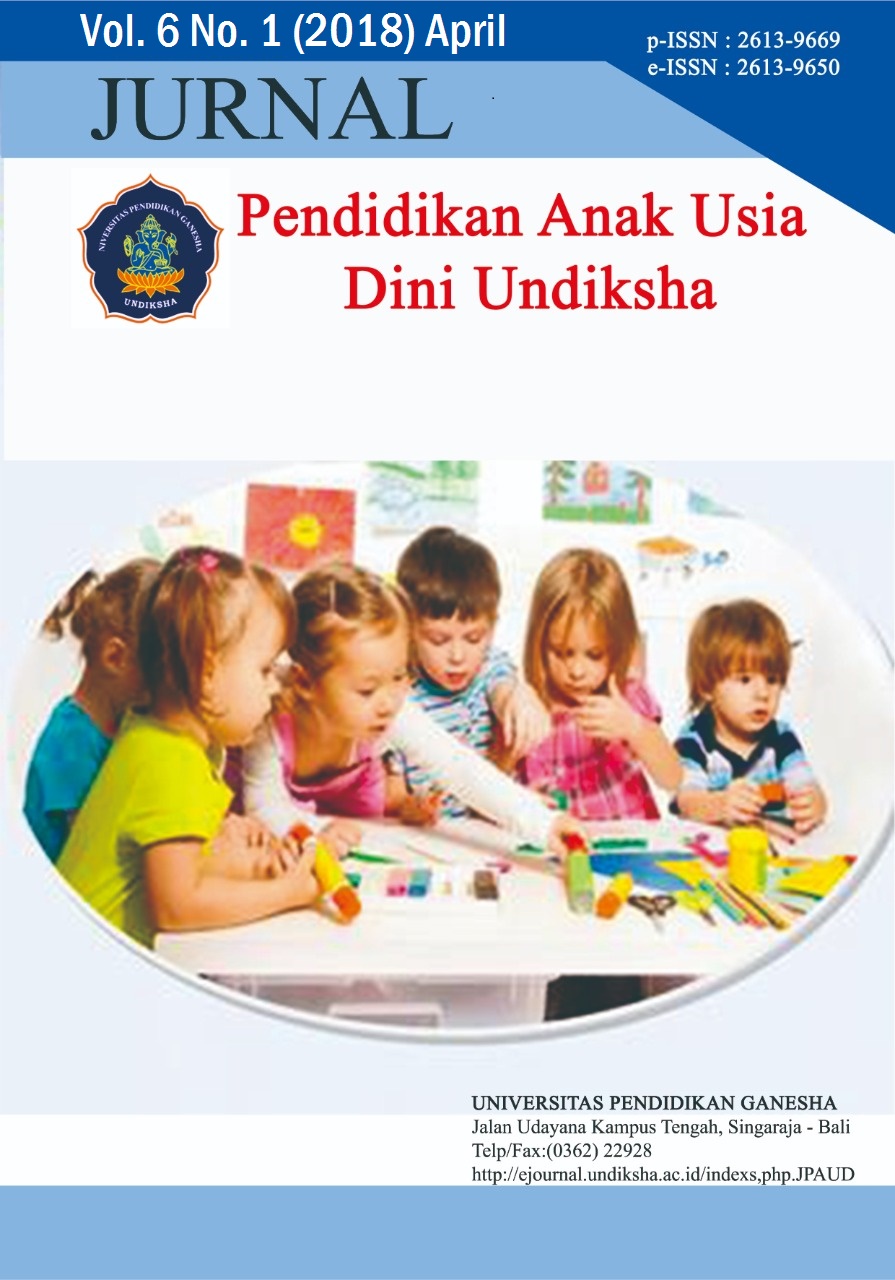*Pengaruh Metode Bermain Peran Terhadap Kemampuan Sosial Anak Kelompok B di PAUD Gugus Anggrek Kecamatan Kuta Utara Tahun Ajaran 2017/2018
DOI:
https://doi.org/10.23887/paud.v6i1.15090Abstract
Penelitian ini bertujuan untuk mengetahui pengaruh metode bermain peran terhadap kemampuan sosial anak. Penelian ini merupakan penelitian kuantitatif dengan jenis eksperimen semu (Quasi Eksperimen) menggunakan rancangan Nonequivalend Control Grup Design. Populasi penelitian ini adalah seluruh anak kelompok B PAUD Gugus Anggrek Kecamatan Kuta Utara terdapat tujuh Tk keseluruhannya berjumlah 586 anak. Sampel ditentukan secara random. Sampel dalam penelitian ini adalah anak kelompok B1 TK Pradnyandari III Kecamatan Kuta Utara berjumlah 24 anak sebagai kelompok eksperimen dan anak kelompok B3 TK Tiara Kasih Kecamatan Kuta Utara berjumlah 21 anak sebagai kelompok kontrol. Data yang terkumpul dianalisis dengan menggunakan teknik analisis statistik deskriptif dan statistik inferensial dengan uji-t. Berdasarkan hasil analisis data diperoleh thitung = 3,49 sedangkan pada taraf signifikan 5% dengan dk = 43 diperoleh ttabel = 2,021 sehingga thitung 3,49 ˃ ttabel 2,021, maka terdapat perbedaan yang signifikan kemampuan sosial antara kelompok anak yang dibelajarkan melalui metode bermain peran dengan kelompok anak yang tidak dibelajarkan melalui metode bermain peran. Adapun nilai rata-rata kemampuan sosial anak yang diperoleh antara kelompok eksperimen lebih tinggi dibandingkan kelompok kontrol (83,38 > 77,07). Maka dapat disimpulkan bahwa metode bermain peran berpengaruh terhadap kemampuan sosial anak kelompok B di PAUD Gugus Anggrek Kecamatan Kuta Utara Tahun Ajaran 2017/2018.Kata Kunci : kemampuan Sosial, Metode Bermain Peran, Anak Usia Dini
*This study aims to determine the effect of role playing methods on the social ability of children. This research is a quantitative research with a kind of quasi experiment (Quasi Eksperiment) using the Nonequivalend Control Group Design design. The population of this research is all children of group B PAUD Anggrek Cluster of North Kuta subdistrict there are seven Tk totaling 586 children. The sample is determined randomly. The sample in this research is the children of group B1 TK Pradnyandari III North Kuta District amounted to 24 children as experimental group and children group B3 TK Tiara Kasih, North Kuta subdistrict, there are 21 children as control group. The collected data were analyzed by using descriptive statistical and inferential statistical analysis with t-test. Based on the result of data analysis obtained t calculated = 3,49 while at 5% significant level with dk = 43 obtained ttable = 2.021 so thitung 3,49 ˃ ttable 2.021, then there are significant differences in social difference of social ability between groups of children who learned through role playing method with groups of children through role playing methods. The mean value of social ability of children obtained between the experimental group is higher than the control group (83,38 > 77,07). So it can be concluded that the role playing method influences the social ability of group B children in PAUD Anggrek Graves North Kuta District Academic Year 2017/2018.
keyword : Social ability, Role Playing Method, Early Childhood
Downloads
Published
2018-07-26
How to Cite
., N. L. N. K. D., ., L. A. T. S., & ., D. M. G. R. K. (2018). *Pengaruh Metode Bermain Peran Terhadap Kemampuan Sosial Anak Kelompok B di PAUD Gugus Anggrek Kecamatan Kuta Utara Tahun Ajaran 2017/2018. Jurnal Pendidikan Anak Usia Dini Undiksha, 6(1), 64–73. https://doi.org/10.23887/paud.v6i1.15090
Issue
Section
Articles
License
Authors who publish with the Jurnal Pendidikan Anak Usia Dini Undiksha agree to the following terms:
- Authors retain copyright and grant the journal the right of first publication with the work simultaneously licensed under a Creative Commons Attribution License (CC BY-SA 4.0) that allows others to share the work with an acknowledgment of the work's authorship and initial publication in this journal.
- Authors are able to enter into separate, additional contractual arrangements for the non-exclusive distribution of the journal's published version of the work (e.g., post it to an institutional repository or publish it in a book), with an acknowledgment of its initial publication in this journal.
- Authors are permitted and encouraged to post their work online (e.g., in institutional repositories or on their website) prior to and during the submission process, as it can lead to productive exchanges, as well as earlier and greater citation of published work. (See The Effect of Open Access)











